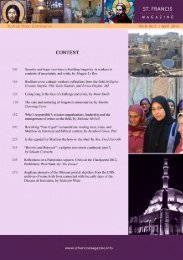download the pdf - St.Francis Magazine
download the pdf - St.Francis Magazine
download the pdf - St.Francis Magazine
You also want an ePaper? Increase the reach of your titles
YUMPU automatically turns print PDFs into web optimized ePapers that Google loves.
<strong>St</strong> <strong>Francis</strong> <strong>Magazine</strong> Vol 8, No 4 | August 2012<br />
gests a type of neo-patrimonialism may develop in which <strong>the</strong> leader<br />
(in this case <strong>the</strong> Iranian pastor) assumes power through patrimonial<br />
power. He suggests that this power is based on “authority, suppressed<br />
subjects and paid military organizations, by virtue of which<br />
<strong>the</strong> extent of a ruler’s arbitrary power, as well as grace and mercy<br />
increases.” (ibid, 2)<br />
There is a strong emotional dimension in hierarchical societies.<br />
People ei<strong>the</strong>r adore or despise <strong>the</strong> leader with equal intensity. Hofstede<br />
states that countries with higher power distance have more<br />
domestic political violence (politically-inspired riots) than lower<br />
power distance countries; and that large power distance countries<br />
are characterized by strong right and left wings with a weak center,<br />
which he calls a reflection of <strong>the</strong> polarization between dependence<br />
and counter-dependence (Hofstede 1991, 38). The center position<br />
(which is considered <strong>the</strong> ideal in Western societies) is seen as a position<br />
of weakness. There will be a power struggle of opinions and<br />
<strong>the</strong> pattern of leadership that can quickly develop reverts to old patterns<br />
of overpowering <strong>the</strong> o<strong>the</strong>rs to keep strong opinions in check.<br />
Iran scores 59 in uncertainty avoidance, meaning <strong>the</strong>y like to maintain<br />
rigid codes of belief and behavior and are intolerant of unorthodox<br />
behavior and ideas. 19 Many Iranians are reluctant to compromise<br />
or to recognize <strong>the</strong> validity of o<strong>the</strong>rs’ points of view and instead<br />
tried hard to convert o<strong>the</strong>rs to <strong>the</strong>ir opinion. It is often difficult<br />
for an Iranian, especially a man, to admit that he may be wrong<br />
(Behjati-Sabet and Chambers 2005, 135).<br />
A significant note for voluntary church organizations is “that<br />
Iranians had very little, if any, experience of participation in voluntary<br />
organizations in Iran, which could be carried over to <strong>the</strong> United<br />
<strong>St</strong>ates.” (Min and Bozorgmehr 2000, 720)<br />
Compared to o<strong>the</strong>r new immigrant groups, Iranians have very few ethnic<br />
associations or organizations. The main explanation for this pattern<br />
is cultural. Voluntary associations were uncommon in Iran, and as<br />
such Iranians do not have <strong>the</strong> requisite experience to establish <strong>the</strong>m.<br />
19 http://geert-hofstede.com/iran.html (accessed 1:15 5/2/12)<br />
<strong>St</strong> <strong>Francis</strong> <strong>Magazine</strong> is a publication of Interserve and Arab Vision 427







![Reflections on Surah Fatiha and the Lord's Prayer[1] - St.Francis ...](https://img.yumpu.com/49377951/1/184x260/reflections-on-surah-fatiha-and-the-lords-prayer1-stfrancis-.jpg?quality=85)









